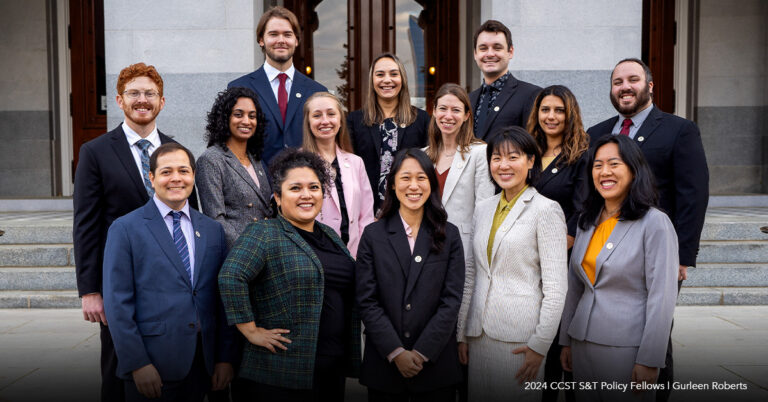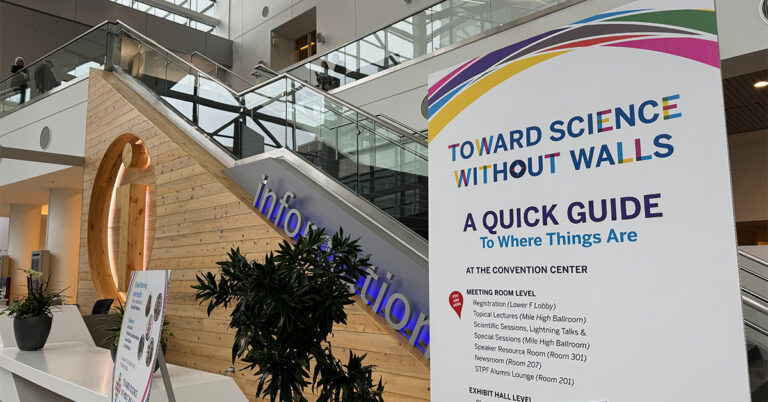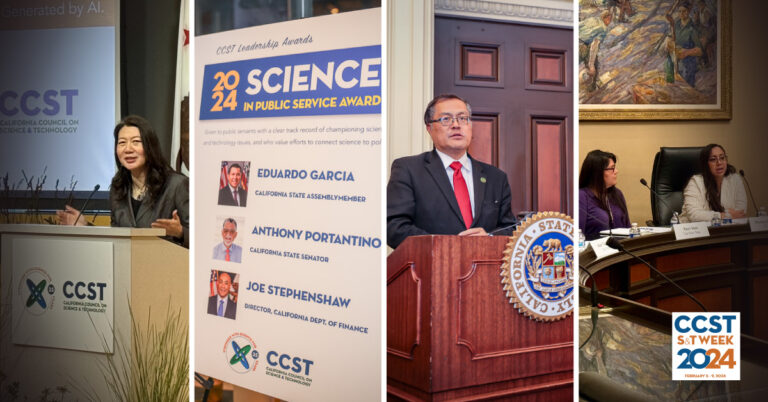Update: Applications for the CCST Science & Technology Policy Fellowship Have Closed
Translating Manure Research to Environmental Policy: Q&A with 2021 Fellow Rylie Ellison
February 16, 2021 | CCST Newsroom, CCST S&T Policy Fellows
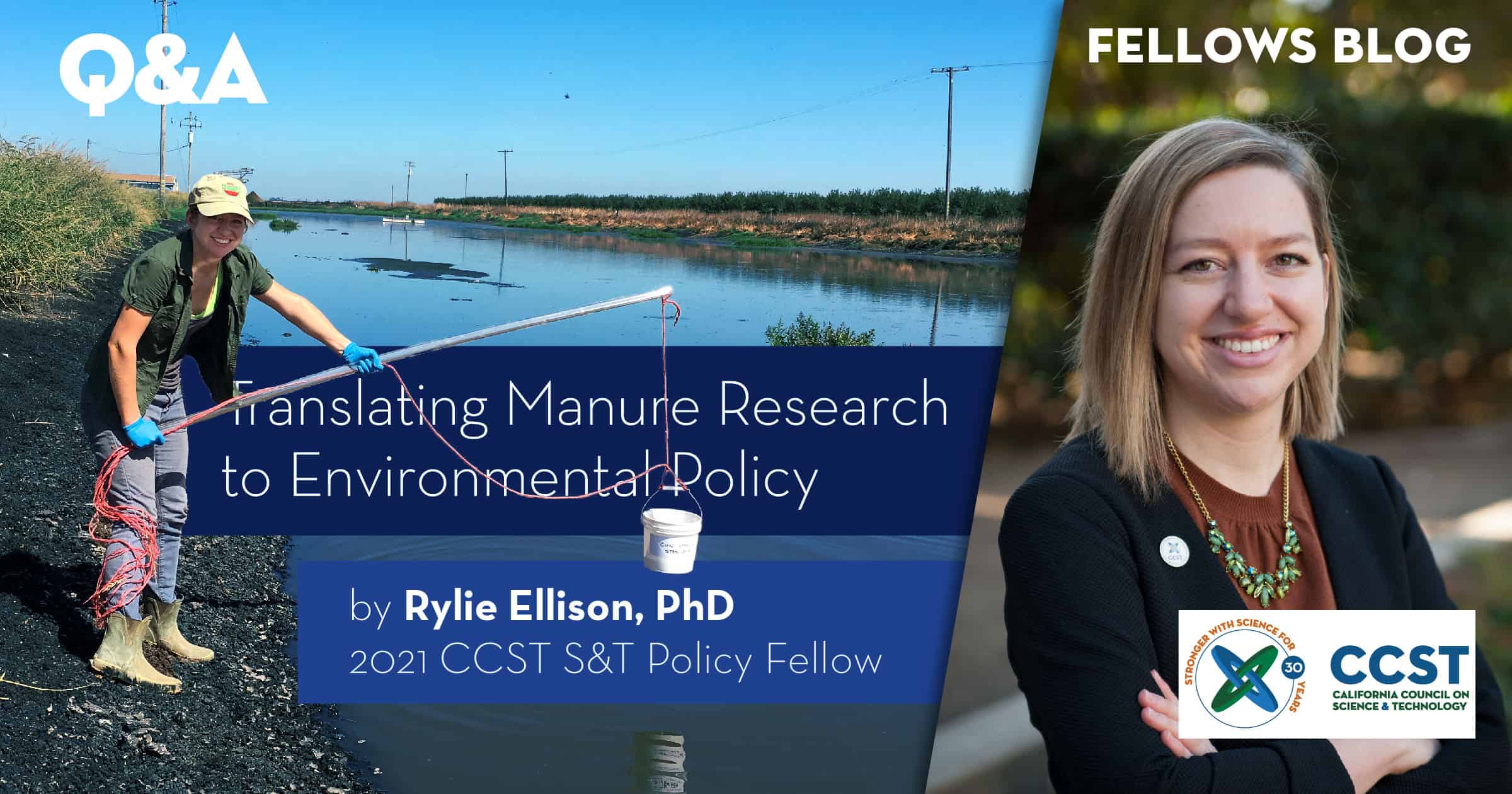
Rylie Ellison is a 2021 CCST Science & Technology Policy Fellow placed on the Senate Committee on Environmental Quality. Originally hailing from Washington State, in her graduate research Rylie developed treatment methods for dairy manure to reduce greenhouse gas emissions and make it a better fertilizer. She earned her PhD in Agricultural & Environmental Chemistry from UC Davis and a BS in Chemistry from Pacific University. Pictured: Rylie collecting manure wastewater at a California dairy for her graduate research.
What did you research in grad school and what brought you to science policy and communication?
In grad school I developed treatments to reduce greenhouse gas emissions from dairy manure and make it a better fertilizer. Throughout my research, I worked with a variety of stakeholders, including farmers, industry, government agencies, and of course academia—each bringing their own points of view and interests. It was a good introduction to a very California-specific issue, considering that California is the largest dairy-producing state and has robust environmental protection regulations.
That work brought my attention to policy fairly early-on. What really solidified my interest was actually hearing from folks who work in policy. Being in Davis, so close to the Capitol, was great because people from state government and other policy organizations like CCST would come to my campus to give career seminars. Their work sounded interesting and impactful to me, so in my second year of grad school I pursued an opportunity to do data analysis for a climate change project with the Governor’s Office of Planning and Research. I was sold—I got to use my skills as a researcher and a communicator to contribute to real policies that will make a positive difference in the world. I was basically just waiting to graduate so I could apply to the CCST fellowship after that so I could make that transition into policy full-time.
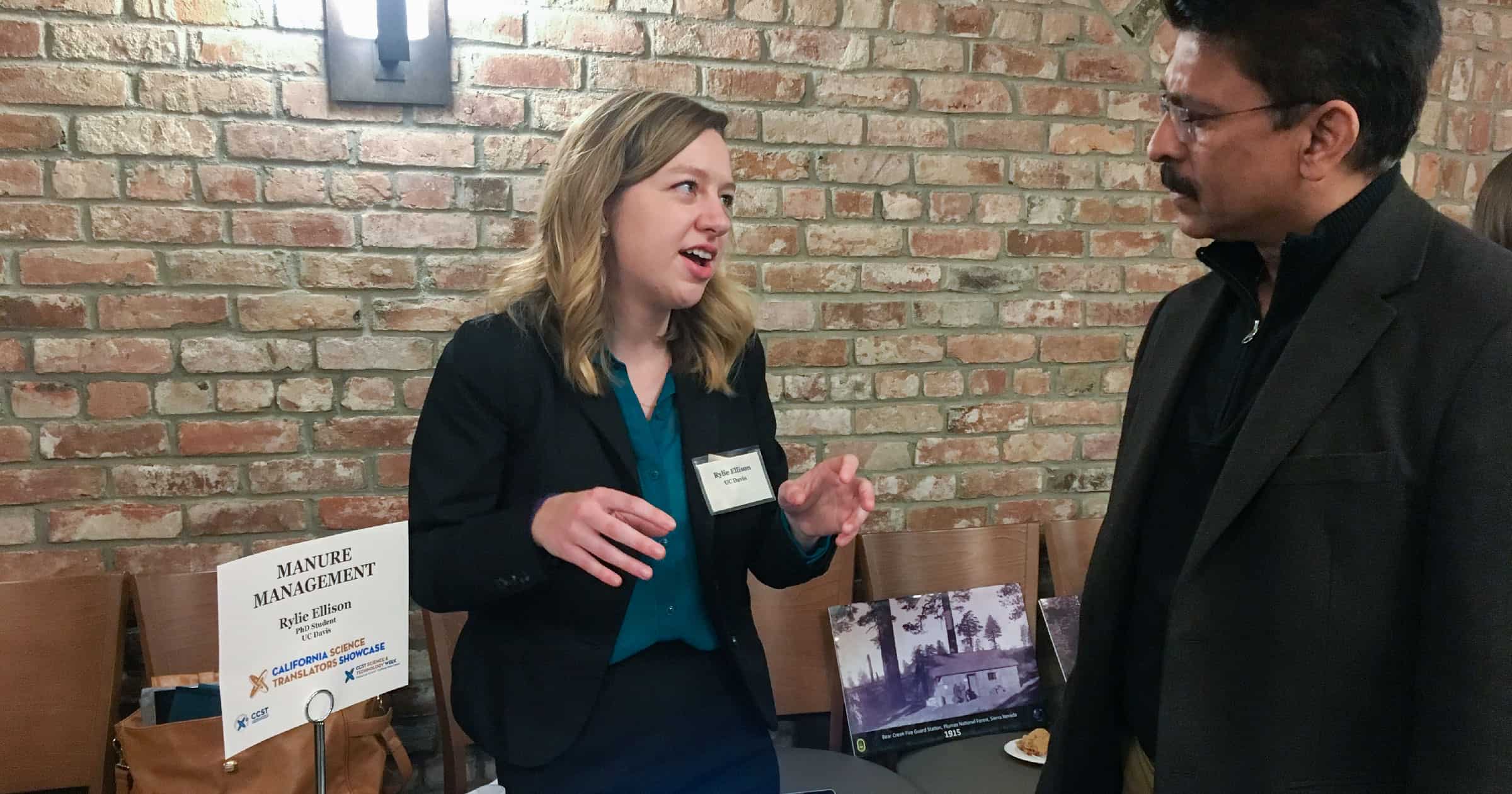
Where are you placed for your fellowship and what are some of the top issues in your committee?
I am working as a consultant on the Senate Committee on Environmental Quality, chaired by Senator Ben Allen. We cover issues like climate change, air and water quality, and waste management, just to name a few. Environmental issues are what I am really passionate about, so I am thrilled to be able to continue working in this space.
What was your favorite part of training? How did it work in a remote environment? Did you feel prepared for your placement?
The remote training was planned and executed incredibly well, especially considering it was the first time it had been done this way. It was all on Zoom of course, but it was a good mixture of lectures, discussions, panels, activities, and social time to get to know one another. My favorite parts were the exercises where we got to practice the types of work that we would be doing in our placement offices such as pitching a bill, briefing a legislator, and writing a bill analysis. That definitely helped prepare me, since I am starting to do some of those things for real right now. I have also been pleased to see a focus on diversity training and career development training, both of which will continue throughout the year. Fellows Program Manager and alum Jeffery Song recently shared his top five lessons learned from adapting the training program for the virtual environment.
I have regular mentorship meetings with my office and alumni mentors that are just focused on talking through challenges I am facing, setting and working towards long term goals, career advice, and more. Plus, there is always someone available to call, no matter what type of question I have.
Does CCST provide mentorship? How does that work remotely?
Yes! CCST provides a ton of mentorship. Not only do we have a mentor in our host offices, but we also have an alumni mentor, a liaison with the state senate for those of us placed there, as well as all the CCST staff who were with us throughout the training. I have regular mentorship meetings with my office and alumni mentors that are just focused on talking through challenges I am facing, setting and working towards long term goals, career advice, and more. Plus, there is always someone available to call, no matter what type of question I have. I have yet to come across a question or a problem that I couldn’t find help with. My fellow Fellows are a great resource as well. We regularly talk and share our experiences and advice from our own offices. It is so nice, especially when working remotely, to start a job with a cohort of peers who are going through the same thing as you.
How have you adapted to remote work and what are some useful ways you’ve found to set yourself up for success?
It is definitely strange starting a job remotely, especially when transitioning to a completely new type of work. For that reason, it was very important to me to find an office with a supportive environment where the people are approachable and don’t mind lots of calls to answer all the many questions that come with starting a new job. I am very lucky to have found that environment with the Senate Environmental Quality Committee.
Another challenge working in policy remotely is that it is generally a pretty social job and involves a lot of regular interaction with legislators, other offices, and stakeholders. I have found myself needing to be much more intentional about introducing myself and setting up Zoom meet & greets with people I would otherwise be running into more naturally in the capitol. It felt strange at first, but it has been helpful to get a feel for the other people who work in this space and to learn the dynamics of the workplace that I would otherwise pick up on in-person. Still, there are a lot of spontaneous interactions that I am surely missing out on.

What would you look forward to most of all if things returned to an in-person environment?
I am very much looking forward to returning to an in-person environment to get the full capitol work-life experience. There are so many little things about working in the legislature that I won’t really understand unless I am in the building: What is it like to be on the Senate floor? What is the office setup like? What do people talk about in the hallways? What is the general atmosphere? Things like that.
I have noticed a common thread amongst scientists who make the transition to policy, which is that their favorite parts of research were not necessarily the data collection or lab work, but more so the part where they got to communicate their work and show how it can be used to solve a problem or make the world better.
How do I know if science policy is right for me? What are some resources I could go to?
I have noticed a common thread amongst scientists who make the transition to policy, which is that their favorite parts of research were not necessarily the data collection or lab work, but more so the part where they got to communicate their work and show how it can be used to solve a problem or make the world better. That was certainly my experience, and I am happy to have found a job where I get to show how science can improve policy-making decisions every day.

It has been promising to see more and more these days both scientists and scientific organizations getting involved in both policy and science communication. It seems like at every conference I went to there would be a workshop on one of these topics. Lots of universities have scipol or scicomm clubs too. These are great resources to get involved early. There are also a ton of different internship and fellowship opportunities out there. CCST Science Fellows alumni put together a great guide for scientists interested in policy. Another easy step, that can be done even in a remote environment, is having some informational interviews. Reach out to people who are doing the kinds of careers you might be interested in. I have been doing this as a fellow and I have been pleasantly surprised at how open people are to talk about their careers and how they got there.
About the CCST Science & Technology Policy Fellowship
The CCST Science & Technology Policy Fellows program trains scientific thinkers to be policy-savvy, while helping equip California’s decision makers with science-savvy staff. The program was established in 2009 with funds from the Gordon and Betty Moore Foundation and other generous friends. Discover how our CCST Science Fellows make a difference in California’s policy arena at ccst.us/ccst-science-fellows-program.

